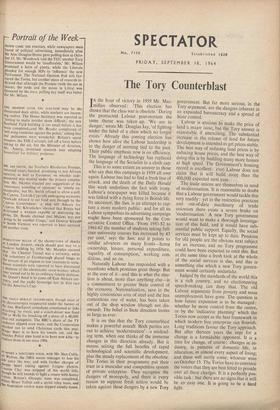The Tory Counterblast
TN the hour of victory in 1959 Mr. Mac- I millan observed : 'This election has shown that the class war is obsolete.' During the protracted Labour post-mortem the same theme was taken up. 'We are in danger,' wrote Mr. Douglas Jay, 'of fighting under the label of a class which no longer exists.' Already this coming election has shown how alive the Labour leadership is to the danger of seeming tied to the past. Their public emphasis now is on efficiency. The language of technology has replaced the language of the Socialist in a cloth cap.
This is to some extent an answer to those who say that this campaign is 1959 all over again. Labour has had to find a fresh line of attack, and the death of the Daily Herald this week underlines the fact with irony. Labour's newspaper was killed because it was linked with a dying force in British life. Its successor, the Sun, is an attempt to cap- ture a more modern public: and for all its Labour sympathies its advertising campaign might have been sponsored by the Con- servative Central Office. 'From 1951-52 to 1961-62 the number of students taking full- time university courses has increased by 43 per cent,' says the Sun; and it points to' similar advances on many fronts—home ownership, leisure, personal expenditure, `equality of consumption,' working con- ditions, and so on.
Naturally Labour has responded with a manifesto which promises great things. But at the core of it—and this is what the elec- tion is about, more than anything else—is a commitment to greater State control of the economy. Nationalisation, save in the highly contentious area of steel and the less contentious one of water, has been taken out of the shop window (though not dis- owned). The belief in State direction looms as large as ever.
It is on this that the Tory counterblast makes a powerful assault. Both parties are out to achieve `modernisation'—a mislead- ing term, when one thinks of the immense changes in this direction already. But it means seizing the full benefits of rapid technological and scientific development, plus' the steady replacement of the obsolete. The Tories in, their programme put their trust in a muscular and competitive system of private enterprise. They recognise the dangers of monopoly, .and there is every reason to suppose fresh action would be taken against these dangers by a new Tory government. But far more serious, in the Tory argument, are the dangers inherent in an expanded bureaucracy and a spread of State control.
Labour is anxious to make the price of land a major issue, but the Tory answer is reasonable if unexciting. The substantial increase in the release of land for future development is intended to get prices stable. The best way of reducing land prices is by reducing house prices, and the best way of doing this is by building many more houses at high speed. The Government's housing record is excellent: even Labour does not claim that it will build more than the 400,000 expected next year.
The trade unions are themselves in need of modernisation. It is reasonable to doubt that a Labour government would tackle this very readily: yet in the restrictive practices and out-of-date machinery of trade unionism there exists a severe brake on `modernisation.' A new Tory government would want to make a thorough investiga- tion of this field, and it would have sub- stantial public support. Equally, the social services must be kept up to date. Pensions for old people are the obvious next subject for an increase, and no Tory programme could have been expected to omit this. But at the same time a fresh look at the whole of the social services is due, and this is something else which a new Tory govern- ment would certainly undertake.
Judged by the standards of the world this is a rich country, and no electioneering speech-making can deny that. The old Labour arguments from poverty and mass unemployment have gone. The question is how future expansion is to be managed : whether by more control from the centre, or by the 'indicative planning' which the Tories now accept as the best framework in which modern free enterprise can flourish. Long traditions favour the Tory approach. But after thirteen years the urge for a change is a formidable opponent. It is a time for change, of course: changes in in- dustry, in patterns of domestic life, in education, in almost every aspect of living; and these will surely come, whoever wins on October 15. The Tories have to convince the voters that.they are best fitted to preside over all these changes. It is a perfectly pos- sible task : but there are no signs that it will be an' easy One. It is going to be a hard fight.


































 Previous page
Previous page